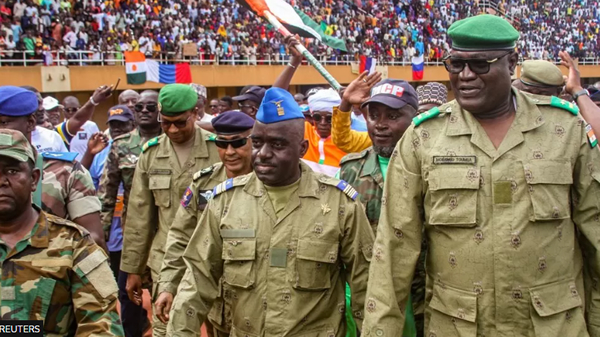
A court for the West African regional bloc ECOWAS has dismissed a lawsuit filed by Niger’s transitional leaders and some corporations over sanctions imposed on Niger by ECOWAS following the July ouster of President Mohammed Bazoum.
The applicants argued the sanctions are causing hardships for millions of Nigeriens. However, the ECOWAS Court of Justice said the military government did not have standing to make a case on behalf of Niger.
Last month, Niger’s military leaders, along with seven corporations, asked the court to suspend the political and economic sanctions imposed on Niger following the July 26 coup d’etat.
However, in its ruling Thursday, the two-man court held that the application was inadmissible, stating that the applicants — including a government instituted by a coup — did not have standing to make a case on Niger.
The court also said it suspected there was a convergence of interests between the military junta and the private entities, and said they were acting in their own interests.
Justice Dupe Atoki delivered the judgment. She said an entity that is a product of an unconstitutional change of government, which is not recognized by ECOWAS as the government of a member state, lacks the capacity to bring this case in which it seems to derive benefits. The judge said action and a request for provisional measures standing in the name of Niger were inadmissible.
Senior military officers overthrew Niger’s government July 26 and have since kept President Mohammed Bazoum in detention.
After the coup, ECOWAS ordered members to close their borders with Niger, seized government assets and halted trade with the country.
Niger depends mainly on Nigeria and the Benin republic for the food it imports. Nigeria also supplies two-thirds of the country’s electricity.
All of that has been halted for months, and millions of citizens and businesses have been struggling to get by.
Godbless Otubure, founder of pro-democracy group Ready to Lead Africa Initiative, says the ECOWAS court ruling is correct.
“The issue at hand is a matter of legitimacy. They’re not a legally elected government of Niger republic, so there’s really no case,” Otubure said. “If the case is heard and judgment is given in favor of the junta, what it means is that there will be more military coups on the continent.”
The United Nations World Food Program estimates the number of people suffering from food insecurity in Niger has doubled to more than 6 million since the sanctions were imposed.
Otubure says ECOWAS should find a way to reduce civilian suffering.
“The issue of sanctions that have now affected more people definitely should be looked into. The people are paying the price for what the military has done,” Otubure said.
Last week, the ECOWAS court was scheduled to issue a decision on a complaint submitted by Bazoum’s lawyers, but the court failed to meet.
The complaint centers on what Bazoum’s lawyers call “sequestration and arbitrary detention.”
Experts say continued sanctions could put a strain on regional relations, especially on joint security and trade and investments.
Source: voanews.com























